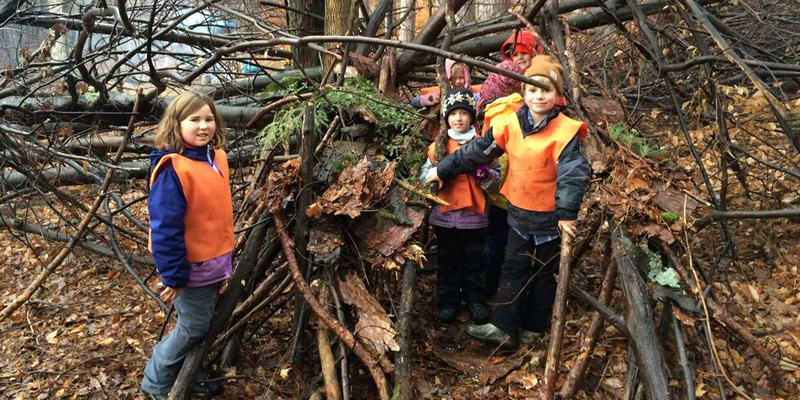Lily Horseman began her career as a freelance playworker, trainer and creative workshop leader and began developing the successful WildPlay project that worked with settings to encourage them to use the outdoors in Herefordshire. Lily went on to work for Bradford Metropolitan District Council delivering Adventurous play and training, becoming actively involved in the Forest School network. She became an accredited Forest School trainer and set up her own Forest School and playwork training company, Kindling, in 2009, and today she is Chair of the Forest School Association.
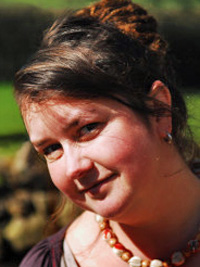
“…I love the idea that you don’t have to say “this is a boys’ thing to do” or “this is a girls’ thing to do.” It’s a HUMAN thing to do. Humans have been exploring the natural environment for thousands and thousands of years…”
“This is what I LOVE doing.” Finding Forest School
I ended up working in the outdoors through working with young people – I was working with people from hard to reach families (families who didn’t really access council services). I found that my favourite bits were most like my own childhood where I was roaming around the woods and taking groups outdoors.
I saw a role come up in one of the Wildlife Trusts working on a project around children’s free play, in the outdoors and nature in particular. It was focusing on children’s own ideas and interests, rather than ‘education’ and “here’s a concept we’re going to transmit to other people”. It was more about how we were going to help people find their own ideas and their own ways of being in this natural environment.
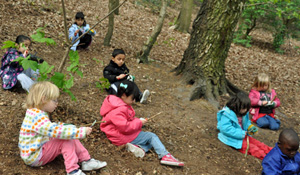
Wearer of different hats
I wear a few different hats. I run Forest School sessions and I work with lots of children and young people in the outdoors in several different contexts. I also have my own training company, Kindling, where I run courses that qualify people to become Forest School practitioners.
I’m also Chair of the Forest School Association. That’s the body that takes a strategic view of Forest Schools in the UK, raising quality levels and supporting practitioners with the challenges they face.
Forest School – moving children from just surviving to thriving
Forest School is an ethos based approach to working with children in the outdoors. It’s got some quite specific elements, which distinguish it from other approaches. People have been working with children in the outdoors for years and years and children have obviously played in the outdoors for thousands and thousands of years so in some ways the concepts aren’t new, but are refined through the ethos of Forest School.
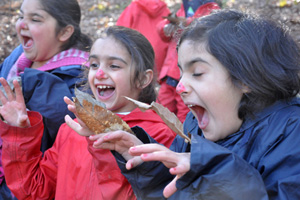
There’s a particular focus on outcomes – personal, social, emotional – for the children. We also are guided by what comes from the children, so there’s that sense of it being child led and child initiated, rather than being adult directed.
One of the other things that makes Forest School distinctive is that it takes place over time, rather than it being a one-off session, it’s about finding repeated time and space for children to move into a place where they feel comfortable and are able to take control. The repeated exposure means they become very familiar with finding their own ideas and interests, which you can’t just do in one afternoon.
That’s one of the things that distinguishes a Forest School programme from other outdoor learning that takes place. We train people to understand the ethos and how to apply it, and how to maintain the wellbeing of individuals, and how to move beyond ‘just surviving’ to ‘thriving’ in their own way.
Embracing the unknowns and making space for them
It might be that I walk into a session with ideas and plans up my sleeve, but one of the glorious things about working with people and nature is that there’s loads and loads of unpredictable elements.

So rather than me saying: “This is my idea and what I’m going to suggest you all do,” I take the cue from the environment and the things that people get excited by. This means that the children’s levels of motivation can increase. If you’re telling somebody to do something, it’s very hard to get their engagement levels as high as when they suddenly discover something for themselves.
It’s about making space for them. Giving them access to things they wouldn’t normally be able to do and embracing the unknowns. There’s a lot of unknowns! Very often, I’ll have no idea what will have happened by the end of the day, even though I’m the one facilitating it. As somebody who never quite grew out of playing, it’s a great way to live life!
Boy and girls: Better together
What’s interesting is this creates opportunities for children (and people more broadly) to find their capacities, to realise things that they didn’t know about themselves. Being in a different environment and doing things a different way.
There’s a particular example of some girls and boys I worked with. They had ten or twelve weeks together and at the start of the programme the group was polarised around very strong gender definitions.
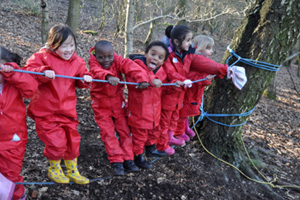
They made this complex pully system so they could get somebody up in a tree. They came up with things they wouldn’t have done without that freedom to explore what everyone was interested in. They could go beyond the gender stereotypes that had been projected on them as part of wider society. This meant that they moved into their own capacities, instead of feeling: “Well, I’m quite academic but I don’t run around.”
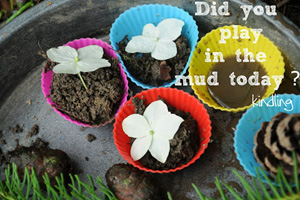
“Girls don’t climb trees!” Er … YES THEY DO…
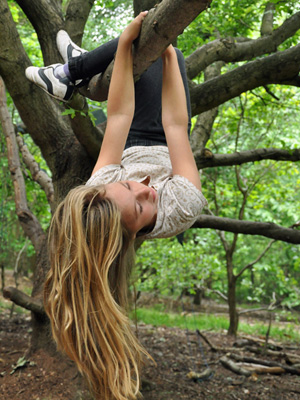
So it’s interesting to me to see how different people thrive in the natural environment. Where people can move beyond their comfort zones, it’s very important that everybody is challenged at a pace that feels right for them.
Traditional schooling often looks at how boys (and also girls too) ‘need to be’. There’s something in particular about boys behaviour that doesn’t meet with traditional school’s expectations of how they should be.
I applied once to work on a project that had a particular emphasis around engaging boys in communication. Having gone up against two blokes for this job, I ended up getting it. That says that it’s NOT about gender. It’s about what your capacities are and what you’re able to do.
Stereotypes don’t help anybody
This was an amazing project where I spent a lot of time working with this group of young boys. Developmentally, they weren’t fitting with expectations of them, but actually it was because they needed something that was different, something that they got in the outdoors. The ability to ‘be’ on a bigger scale, and a louder scale.
There are many people who don’t fit with that role of someone who will spend their day sitting nicely and facing forwards. That’s not necessarily about girls and boys, but boys in particular get chastised or get into trouble for being that person. Forest School can be a real release for those people who need to work on a bigger scale, a louder scale and a more practical scale. Stereotypes don’t help anybody.

It’s interesting to look at The Simpsons and the way they portray gender stereotypes. Lisa Simpson is very academic and she’s very good at everything but she feels an anxiety because she can never be quite good enough. For her the praise she receives is always about being ‘the product’ – being pretty, being good at music, and she feels she can never live up to that stereotype.
Bart Simpson, on the other hand, always gets told off for being too noisy and all those kinds of things. He’s not ‘the product’ that people expect either. He gets criticism for the processes he engages in.
For both of them if you focus on the process rather than the product, you can support where they are and what they’re doing, rather than expectations for them because of their gender, or because of their age, their background or whatever it is. We do a lot of people a disservice by praising and putting our expectations on the products we expect them to be, rather than encouraging and supporting the process of who they are being in that moment.
Coming up next for me, Kindling and the Forest School Association
At the Forest School Association, we’re working on schemes which recognise practitioners and organisations who are exploring the ethos of Forest School deeply, we’ve been launching these schemes over the last year and embedding them into the Forest School community. That’s been quite a big piece of work.
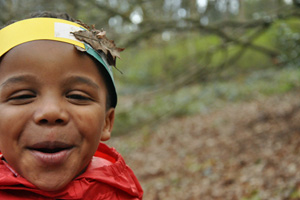
http://kindlingplayandtraining.co.uk/
https://twitter.com/kindlinglily
https://www.facebook.com/Kindling1/
http://www.forestschoolassociation.org/
https://twitter.com/fsaforestschool
https://www.facebook.com/ForestSchoolAssociation/
Main Forest School image credit: By RMSC rochester (Own work) [CC BY-SA 4.0 (http://creativecommons.org/licenses/by-sa/4.0)], via Wikimedia Commons

